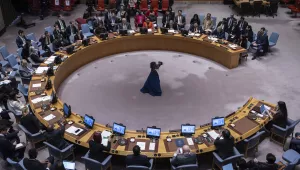What no doubt was conceived as a celebratory forum for Democratic and centrist national security professionals turned into something altogether different Monday morning.
Adjusting to the election defeat of Hillary Clinton, defense and foreign policy experts like Michèle Flournoy, who was seen as the favorite to become the first female Defense secretary, and Nicholas Burns, who was thought to be in the running for a senior position at the State Department or White House, offered their recommendations on foreign policy and on what qualities they hope President-elect Donald Trump will look for as he selects a leader for Foggy Bottom.
“It’s no secret that Michèle and I . . . were planning a different kind of transition under the Clinton administration,” said Burns, who served as the State Department’s No. 3 official from 2005 until 2008, at the top of the forum organized by the Aspen Strategy Group.
Asked to comment by CQ on who they hope will be picked from a short list of likely Trump candidates, each of the panelists demurred, offering instead a broad sketch of the background and personality they hope the next leader of Foggy Bottom will bring with them.
Among the names in heavy circulation are Senate Foreign Relations Chairman Bob Corker, R-Tenn., a pragmatic, deal-making legislator who wants to improve the operations of the State Department; former U.S. Ambassador to the United Nations John Bolton, who earned a reputation in the George W. Bush administration as an outspoken proponent of U.S. military intervention and as a skeptic of international institutions; and former House Speaker Newt Gingrich, who also champions U.S. interventions and has a history of supporting free-trade deals.
Flournoy said she thought it was important the next secretary have “influence, and gravitas and weight to actually change the mind of the president, to actually be able to speak truth to power.”
The CEO of the Center for a New American Security said it was key for Secretary of State John Kerry’s successor to be able to make a “really compelling case on Capitol Hill for investments” in the civilian foreign policy apparatus. “Someone who can help Congress to understand that $1 invested in the State Department is not $1 invested in bigger government, it’s a dollar invested in influencing events beyond our shore.”
Dov Zakheim, a former undersecretary of Defense in the George W. Bush administration, said the next secretary would have to walk a fine line between being able to speak against potential bad policies while also maintaining the trust of Trump. “He’s got to trust the secretary enough to listen to him when the secretary disagrees with him,” said Zakheim, now with the Center for Strategic and International Studies.
Added Burns: “I think you can see a unity in the last three secretaries of State,” he said referring to Condoleezza Rice, Clinton and Kerry. “I think all of those secretaries of State . . . have decided that we need to return diplomacy to the center of American foreign policy.”
Assembling a National Security Team
Stephen Hadley, national security adviser to George W. Bush and a potential Defense secretary pick for Trump who was also at the forum, said he thinks the real estate tycoon should do more to empower his cabinet secretaries and ambassadors in the field.
“It’s more of a business model, it’s not the lawyers’ model,” said Hadley, the author of a chapter in a new book from The Aspen Institute on reforming the country’s national security architecture. “What I’m arguing for is a little bit more decentralization. “
Tom Donilon, who led the Clinton-Kaine transition team and served as national security adviser during President Barack Obama’s first term, said it was important for Trump to assemble a team made up of personalities who are able to work well together.
“Some presidents think they can handle . . . a set of large personalities,” Donilon said, cautioning: “A president can’t be a full-time manager of his or her national security team. You heed to put together a team from the get-go that wants to act as a team. Put in place really express rules for the road.”
Donilon pushed back, however, on a growing sentiment among Republicans who said they want the White House NSC staff to be significantly drawn down, possibly through legislation.
“I really object to some arbitrary number to the people who are put on the National Security Council,” he said, calling instead for more integration between NSC and the vice president’s staff while allowing agencies to take more of a leadership role.







